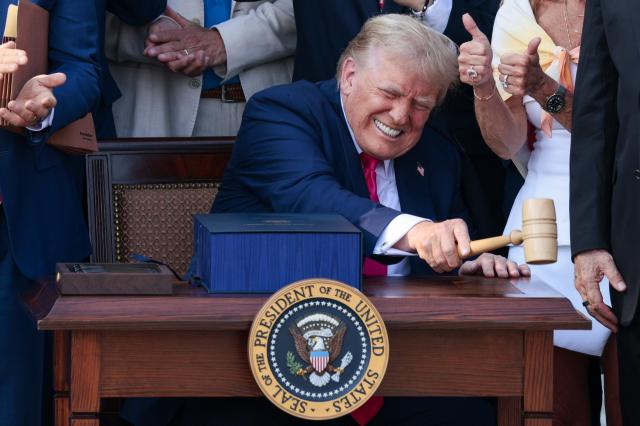
SEOUL, July 06 (AJP) - U.S. President Donald Trump has signed into law a wide-ranging economic bill — dubbed the “One Big Beautiful Bill for America,” or OBBBA — cementing key elements of his domestic agenda and delivering a potential windfall to South Korea’s semiconductor and shipbuilding industries.
The legislation, signed on July 4, includes a suite of measures aimed at reducing taxes, reforming welfare, strengthening national defense, and loosening government regulations.
Among the chief beneficiaries are industries expected to see increased federal spending under the Trump administration, with semiconductors leading the pack.
A centerpiece of the bill is an expansion of investment incentives tied to the 2022 CHIPS and Science Act.
The tax credit for companies constructing semiconductor manufacturing facilities in the United States will rise to 35 percent from the current 25 percent — an aggressive push to boost domestic chip production and reduce reliance on overseas suppliers.
Analysts in Seoul say the new incentives could offer a significant tailwind for South Korean tech firms like Samsung Electronics and SK hynix, which have already poured billions into U.S.-based fabs and R&D. Given the heavy capital intensity of the semiconductor industry, analysts expect the enhanced tax benefits to accelerate construction timelines and shorten the path to profitability.
“The increased investment tax credits could prompt earlier groundbreaking of new fabs and research centers,” said one industry analyst. “That could have a meaningful impact on earnings going forward.”
The legislation also earmarks $32.7 billion for the U.S. Department of Defense to rejuvenate the domestic shipbuilding industry, a move widely interpreted as part of Washington’s broader efforts to secure defense supply chains and strengthen military readiness.
South Korean shipbuilders, including Hanwha Ocean and HD Hyundai Heavy Industries, are expected to be key partners in this initiative. Both companies are poised to win contracts in the U.S. commercial and naval ship markets, potentially starting in the second half of the year.

Not all sectors fared well under the new law.
Clean energy and healthcare industries, once central to the Biden-era Inflation Reduction Act, face significant setbacks.
The OBBBA imposes steep cuts to tax credits previously offered for renewable energy and electric vehicle purchases. It also tightens eligibility deadlines, raising uncertainty around long-term investment in green technologies.
Tax credits of up to $7,500 for electric vehicle purchases, originally set to remain in place through 2032, will now expire on Sept. 30. Similarly, tax incentives for solar and wind projects will begin phasing out in 2026 and are scheduled to be eliminated entirely by 2028 — four years ahead of schedule.
Analysts warned the changes could dampen investor sentiment across the clean energy, battery, and EV sectors.
“It’s not just the early sunset of the tax credits,” said another analyst. “The bill also strips away mechanisms for raising funds in these areas, effectively halting meaningful federal support.”
While the OBBBA marks a significant pivot in U.S. industrial policy, it also signals a recalibration of priorities — favoring strategic manufacturing and defense capacity over decarbonization and healthcare expansion.
Copyright ⓒ Aju Press All rights reserved.




